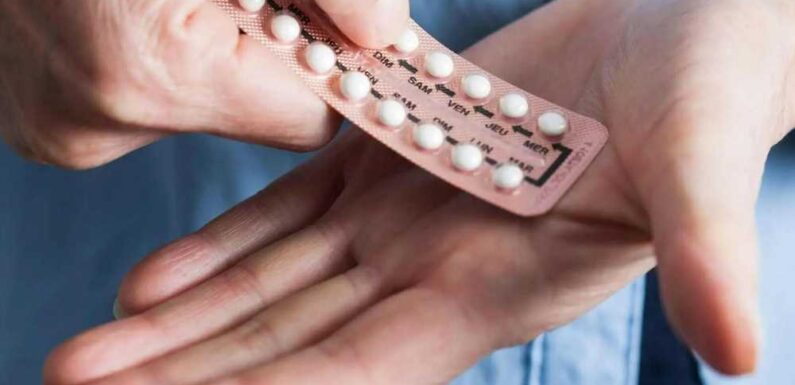
HOT FLUSHES, night sweats, mood swings, vaginal dryness – these are just some of the symptoms brought on by the menopause.
Caused by a drop in the levels of oestrogen and progesterone produced in the ovaries, these often debilitating symptoms can be treated with hormone replacement therapy (HRT).
It comes in a variety of guises, such as pills, tablets, patches, gels, sprays, coils and pessaries.
You'll usually need to take HRT for two to five years, although some might need to for longer.
What are the side effects of HRT patches?
It's common to experience some side effects while taking HRT, though these should improve after six to eight weeks.
Doctors usually advise you continue your treatment for at least three months if you can.
Read more on HRT
The TRUTH about HRT and dementia – as leading GP slams ‘flawed’ study
Major change to HRT prescriptions saves women £1.1m – are you eligible?
But you should speak to a GP if your side effects are severe or they continue after three months have elapsed.
You side can vary depending on whether your taking oestrogen, progestogen or you're on combined HRT,
According to the NHS, side effects from oestorgen include:
- headaches
- breast pain or tenderness
- unexpected vaginal bleeding or spotting
- feeling sick (nausea)
- mood changes, including low mood or depression
- leg cramps
- mild rash or itching
- diarrhoea
- hair loss
Most read in Health
Gross habit millions of Brits have could increase risk of catching Covid
Another pandemic 'would kill 840k and is "most serious threat" facing UK'
Video of girl beaming with pride at her new hair clip hides devastating truth
Jägerbomb alert as drinking booze & Red Bull 'increases risk of sexual violence'
But for progestogen, they could be:
- changes in your periods, including spotting or bleeding between periods
- headaches
- breast pain or tenderness
- feeling sick
- diarrhoea
- feeling tired or dizzy
- mood changes, including low mood or depression
- mild rash or itchy skin
- acne
Your doctor will usually recommend you go on continuous combined HRT if you have not had a period for one year or more.
You might get some of the same side effects you would from oestrogen or progestrogen-only HRT, including:
- headache
- breast tenderness or pain
- unexpected vaginal bleeding or spotting
- feeling sick
- mood changes
- muscle cramps
- diarrhoea
- mild rash or itchy skin
- itching or hives
With HRT patches specifically, you might find they don't stick well, especially if you moisturise your skin.
Patches can also cause redness or irritation, or leave a mark, NHS guidance states.
It's best to apply them to dry, un-moisturised skin and peel them off slowly to avoid marks.
How long after starting HRT do you feel a difference?
HRT can take up to three months to work fully to improve your menopause symptoms.
Signs HRT is not working for you
If side effects persist for more than three months after starting on HRT, it might be a sign to switch up your treatment by speaking to a doctor.
In rare cases, you might experience some more serious side effects.
They could include:
- Pain, redness or swelling in your legs – it's important to speak to a doctor if you experience this, as it could be sign of deep vein thrombosis, a blood clot in a vein in your leg
- A lump or change in your breasts – dimpling of the skin, changes in the nipple or any lumps you can see or feel are important to see a GP about as this could be a sign of breast cancer
- Any changes in vaginal bleeding after you've been taking HRT for more than a few months – this could be a sign of womb cancer
The NHS noted that it's important to attend your breast screening appointments while you're taking HRT, as the treatment has been associated with a small increase in the risk of blood clots and breast cancer.
What are the side effects of stopping HRT suddenly?
If you're thinking about stopping HRT, the National Institute for Health and Care Excellence (NICE) says you can do so immediately or gradually.
But it notes you should speak to a GP before doing so, so they can advise you about the best option for you.
Meanwhile, the NHS recommends gradually reducing your dose of HRT as you wean yourself off it.
This is because it's possible that you'll experience some of the menopausal symptoms the drugs were keeping at bay once you stop taking them.
According to NICE and the NHS, they may return less quickly if you stop taking HRT gradually.
Health and vitamin expert Nature's Best states that milder forms of HRT – like topical creams for vaginal dryness – can be stopped immediately, but recommends you wean yourself of HRT medication over a two-to-four-month period.
"Your GP may advise lowering your HRT dose, cutting HRT pills in half, or using a patch with reducing doses," it wrote.
"You should not come off HRT suddenly or go ‘cold turkey’.
"If you stop HRT abruptly, your hormone levels will fluctuate from high to low within a short amount of time.
Read More on The Sun
Martin Lewis’ MSE reveals how to get free food at McDonald’s – fans will love it
Urgent warning over £2 garden mistake – and it could cost you £100,000
"As a result, your body may go into ‘overnight menopause’, and bothersome symptoms may quickly reappear."
Even if you manage your HRT withdrawal well, it is still likely that you'll experience some symptoms coming off it – but these should subside after a few months.
Source: Read Full Article








